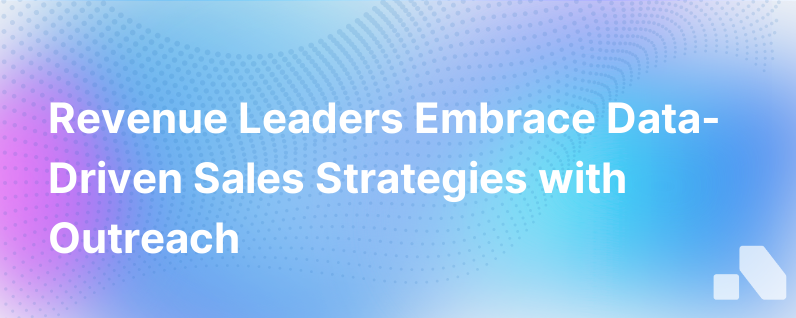How Revenue Leaders Are Using Data Not Instincts To Drive Sales Strategies With Outreach
Published on October 18, 2023 by Sawyer Middeleer
The modern revenue leader is constantly seeking innovative ways to boost their sales strategy, and data has emerged as the compass guiding these strategic decisions. No longer do sales teams rely solely on instinct and experience to pursue leads and close deals. Instead, the incorporation of data analytics into sales processes is revolutionizing the way outreach is conducted. This paradigm shift isn't just about the volume of data, but about harnessing the right kind of data to inform decisions, predict outcomes and ultimately drive sales strategies more effectively.
In this article, we'll examine the growing trend of data-driven sales strategies in outreach and how revenue leaders leverage data to make more informed decisions that significantly boost their team's performance and overall company growth.
Understanding the Shift from Instinct to Data-Driven Strategies
Sales strategies traditionally leaned heavily on the instincts of experienced sales professionals. Past trends, educated guesses, and a 'feel' for the market dictated decisions. However, relying solely on these methods can lead to subjective decisions and overlooked opportunities.
The proliferation of sales intelligence software and advanced analytics has allowed a more empirical approach. Data-driven revenue leaders are now equipped to parse through immense datasets to identify patterns, trends, and actionable insights. This ability ensures that every decision is not just a best guess, but a calculated move based on a clear understanding of the current market conditions and potential outcomes.
Leveraging Data in Sales Outreach
Sales outreach is no longer a game of darts; it's becoming a precise science. With the proper data at your disposal, you can:
1. Identify High-Value Targets
Using data, revenue leaders can better identify which prospects are more likely to convert. Predictive analytics and machine learning algorithms analyze historical data and industry trends to score leads and prioritize outreach efforts. As a result, sales teams can focus their time on engaging with prospects that have the highest potential ROI.
2. Personalize Communications
One size doesn't fit all in sales, and data helps tailor the outreach message to individual prospects. By analyzing data collected from various touchpoints, sales reps can understand a buyer's unique pain points and preferences, crafting personalized messages that resonate and drive engagement.
3. Optimize Timing and Channels
The 'when' and 'how' of outreach are crucial. Analyzing behavioral data, such as when leads open emails or engage with content, helps pinpoint the optimal time to reach out. Similarly, understanding which communication channels a prospect prefers enables sales teams to be more strategic about their outreach mediums.
4. Refine Sales Content
Data analytics can also inform the creation and distribution of sales content. By tracking engagement across different pieces of content, sales teams can gain insights into what type of content performs best at various stages of the sales funnel, allowing for a more strategic approach to content marketing.
Integrating Data into Sales Strategy
Establishing a Strong Data Infrastructure
The foundation for any data-driven sales strategy is robust data infrastructure. This includes customer relationship management (CRM) platforms, sales engagement platforms like Outreach, marketing automation tools, and analytics software. These tools collect and organize vast amounts of data, streamline sales processes, and provide a comprehensive view of prospects and customers.
Emphasizing Data Quality
Revenue leaders recognize that data-driven decisions are only as good as the data itself. Therefore, they prioritize the accuracy, completeness, and consistency of data. They ensure that the data gathered is clean and reliable, minimizing the risk of errors and maximizing the insights that can be extracted from the data.
Cultivating a Data-Literate Culture
It's one thing to have access to data, but another to know how to interpret and apply it. Progressive revenue leaders focus on building a sales culture where data literacy is valued. They invest in training and resources to ensure that their teams can understand and utilize data effectively.
Utilizing Predictive Analytics
Predictive analytics takes data-driven sales strategies to the next level. By applying statistical models and forecasting techniques, sales teams can predict future trends, customer behaviors, and sales outcomes with greater accuracy. This forward-thinking approach allows for strategic planning, better alignment of resources, and proactive decision-making.
Continuous Testing and Learning
The most successful revenue leaders understand that the sales landscape is constantly evolving. They instill a philosophy of continuous testing and learning within their teams. A/B testing outreach strategies, experimenting with new data sets, and continuously refining processes ensures that strategies remain effective and agile.
Adopting Advanced Sales Intelligence Platforms
Finally, to truly harness the power of data in outreach, revenue leaders are turning to advanced sales intelligence platforms like Aomni. By consolidating data from various sources and implementing AI and machine learning, these platforms provide real-time insights, automate tasks, and ultimately enhance the efficiency and effectiveness of sales strategies. They bridge the gap between data collection and actionable insights, making data-driven decision-making more accessible for sales teams of all sizes.
Conclusion
In today's competitive landscape, data, not instincts, is the catalyst propelling sales strategies forward. By leveraging insights derived from advanced analytics, CRM platforms, and sales engagement tools, revenue leaders are crafting smarter, more effective sales outreach approaches. This data-driven ethos not only leads to better alignment with customer needs but ensures that every action taken by the sales team is underpinned by empirical evidence, resulting in more predictable and scalable growth.
The brands that adopt data-driven strategies will not only see improved performance but will also set new standards in sales excellence. For sales leaders and organizations willing to invest in data infrastructure and culture, the rewards can be transformative.